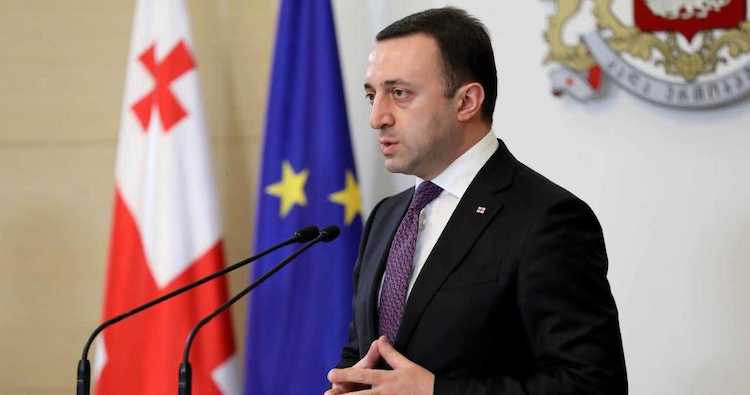The growing concern about gambling addiction, gambling advertising and harm often caused to vulnerable groups by the industry were the topic of agenda.ge interviews with international and Georgian officials and authorities on the subject, which shed a light on international practices and their adoption by local agencies working on the matter.
Why is gambling and online gambling so problematic, and why is it recognised as a threat to vulnerable groups, especially adolescents? Agenda.ge asked these questions to Ghassan Khalil, the UNICEF Representative in Georgia.
Photo: Unicef Georgia Facebook page.
Gambling disorder is hidden addiction. Unlike substance abuse where physiological levels are quantified by the presence of alcohol or illicit drugs in the blood, there are no similar simple objective methods and indicators available for problem gambling,” Khalil said, noting “addiction to gambling among adolescents is a growing problem around the world, including Georgia”.
It was the particular concept that related to the information he provided to agenda.ge on a study conducted by UNICEF in partnership with the Gambling Research and Ludomania Prevention Center in 2021. The organisations surveyed 1,000 adolescents aged 14-17 across Georgia to study their knowledge, attitudes and gambling practices.
The research aimed to determine the experience of adolescents in gambling for money, study their gambling-related behaviour, and identify adolescents’ motivators and attitudes towards gambling and ludomania. In the study, more than one in 10 adolescents said they practiced gambling with varying frequency, and over a quarter were actively involved in gambling with a frequency of at least a few days a week.
The survey also showed 22 percent of teenagers saying their first gambling experience had taken place at age 11 or earlier, while the majority – 78 percent – had started the practice at 12 or older. One in five teens in the study who gambled reported being in a depressed mood stemming from the activity, and two percent were involved in self-harm.
Adolescents’ susceptibility to the social environment was also identified by the study, which showed they rarely started gambling by themselves, usually getting involved with friends and peers (51 percent) or a family member (32 percent). In responses to the survey, 24 percent said they were involved because their friends were gambling, while 16 percent believed gambling to be an activity connected with status among peers.
Becoming initially involved in gambling, and continuing the engagement, was tied in the report to the desire to win money and have an outlet for spending free time. Other motivators included boredom and the perception that gambling is popular. Although minors in Georgia are not allowed to enter casino venues or register on online gambling platforms, 24 percent of the surveyed adolescents who gambled reported their first gambling to be at a casino, a slot club or a casino website. Further, 18 percent of the participants of the survey reported their parents knew about their practice. Only six percent of parents forbid their children from practising gambling, leading to household conflicts over the issue.
“The study found that the level of awareness of adolescents about the risks associated with gambling and gambling addiction is low. The majority of adolescents who gamble do not talk to their parents about gambling and its risks. One third of adolescents report that if they become addicted to gambling, they would not turn to anyone for help but try to solve the problem alone,” the UNICEF Representative said in comments to us, adding gambling prevention was most effective when initiated before the development of gambling habits among adolescents.
This could be achieved by awareness rising of the risks and consequences of at-risk gambling of the adolescents themselves, school-based education activities, informal education of adolescents, public health policy introduction and implementation. For gambling prevention among adolescents, it is also crucial to increase knowledge of the parents, teachers, communities and health workers in early identification of multiple signs of problematic gambling behaviour and in effective responding,” Khalil also noted.
The position of UNICEF is in line with the contemporary approaches in leading countries for preventing problematic gambling. In the United Kingdom, precautionary measures include strict limitations on advertising space, while the “smartphone age” requires a completely different approach. A BBC article on March 8, 2022 cited the House of Lords on the figure of 300,000 people in the UK being problematic gamblers, with 55,000 being children. On average, a problematic gambler commits suicide every day, and about two million people are affected by the issue.
“The chairman of Peers for Gambling Reform Lord Foster is calling for urgent changes to be made to the UK’s ‘out of date’ gambling laws. The peer said smartphones had led to ‘absolutely massive’ growth in gambling but the current regulations were written before they were invented. He said: ‘There are a lot of changes urgently needed’,” the article noted.
Speaking to the BBC, Lord Foster added it was “worth remembering that the legislation that provides the regulation around gambling was introduced before the first smartphone was invented.”
 Photo: BBC.com
Photo: BBC.com
It is important to note that drastic changes were recently announced in the UK that illustrated the impact of athletes, influencers, celebrities and their advertising activities on people’s consciousness. Starting in October, gambling and betting companies will be banned from using advertising featuring top-flight footballers and other sports personalities, as well as reality TV and social media stars, under new rules designed to protect under-18s and other vulnerable groups, the Guardian said.
The article noted “the changes, set out by the body responsible for the UK code for advertising, will mean that past betting and gambling marketing that features stars and celebrities such as Cristiano Ronaldo, José Mourinho, Michael Owen and Harry Redknapp, would not be allowed in the UK. The wide-ranging new rules also include a ban on showing specific teams’ football kit and stadiums in ads, as well as using video game content and gameplay popular with under-18s. ‘No more top-flight footballers or other high-profile sportspeople promoting the latest odds,’ said Shahriar Coupal, the director of the Committee of Advertising Practice, which sets the rules enforced by the UK’s advertising watchdog.”
 Photo: Cristiano Ronaldo’s Facebook page.
Photo: Cristiano Ronaldo’s Facebook page.
Former England and Arsenal footballer Paul Merson, who became addicted to gambling himself, told BBC Sport it “sickens” him to see former players and managers in gambling adverts.
As for the Georgian reality, the difficulty of the situation with gambling in the country has been highlighted by studies indicating the activity has become a significant challenge for teenagers and the vulnerable groups of the society. Over the years, various non-governmental organisations, politicians and activists have called for stricter gambling laws, and urged the Government to take preventive and adequate steps.
On June 1, 2020, the EMC non-governmental organisation responded to the problem of juvenile gambling involvement by saying participation in child gambling remained a “serious challenge” that increased the risk of chronic poverty and psychosocial problems. In efforts to ensure a safe environment and healthy development opportunities for juveniles, EMC called on the Georgian Government to develop strict gambling regulation mechanisms to prevent juvenile delinquency.
In early 2022, the initiative of Prime Minister Irakli Garibashvili on imposing restrictions on gambling and its advertising in the country was announced. The new legislative regulations for online gambling businesses banned online gambling for one million citizens starting March 1. Georgian nationals receiving social assistance from the state, citizens under the age of 25, public servants and individuals on blacklists following requests by their families have been prohibited from the activity. Gambling ads on TV, websites, and outdoors have been banned, with only sponsorship agreements allowed. Financial operations can be made only by registered users, while money transfers between gamblers are restricted. Restrictions were also imposed on citizens gambling through foreign online casinos, and. tax providers have been denied transfers to foreign gambling business accounts.
The head of the Government said “lots of people – minors, young, vulnerable people” were addicted to online gambling, and cited ₾1.5 billion ($312m/€278m) being spent by citizens annually in online casinos in his announcement of the new regulations, adding the ban was now also placed on payments to gambling businesses abroad.
 Photo: Government’s Administration.
Photo: Government’s Administration.
At the same time, it is important to know how the amended legislation is being implemented, what international standards have been adopted, and what data the Government has at its disposal at the moment. We directed these questions to the Revenue Service of the Finance Ministry, the body responsible for enforcing the new legislation. These questions also come at a time when critical opinions have emerged in parts of the public over the initiative, with speculation about a significant financial loss from limitations placed on gambling and related businesses.
Levan Dgebuadze, the Head of the Service Department of the Revenue Service, told Agenda.ge the Gambling Business Policy Division at the Ministry of Finance had studied and taken into account international practices and experience while amending the law.
 Photo: Revenue Service of Georgia.
Photo: Revenue Service of Georgia.
Dgebuadze said while preparing amendments to the Law on Arranging Lotteries, Gambling and Gaming, representatives of the Division had studied a multilateral agreement related to online gambling in the European Union which covers a wide ranges of issues: harmonisation of third country legislation with EU laws; regulations for issuing individual permits, protection of users, minors and vulnerable groups, prevention of fraud and money laundering, and more.
The Gambling Business Policy Division of the Georgian Ministry also reviewed the 2017 EU Framework for Online Gambling, according to which a separate permit is required in EU countries to set up gambling platforms, with a fee required for the permit. The recommendation of a 2019 European Commission on Evaluation of Regulatory Tools for Enforcing Online Gambling Rules and Channeling Demand towards Controlled Offers was also studied, with the document envisaging establishment of permits for online gambling by national gambling services and online.
The amendments of the Georgian Law were also prepared in accordance with the 2012 Georgia report of the Committee of Experts on the Evaluation of Anti-Money Laundering Measures and the Financing of Terrorism of the Council of Europe, which noted there was no requirement for a separate permit for online gambling in the country. The report also said there was no mechanism to reduce the risks associated with online gambling.
Based on the above, the Revenue Service is “constantly analysing” the legal framework of foreign countries, proactively studying problematic issues and, if necessary, constantly developing legislative initiatives, said Dgebuadze.
When asked about enforcement, the Director of the Department said inspections of permit holders were carried out through a “selective inspection” of permit conditions.
“The Revenue Service is authorised to control implementation of permit conditions. For this purpose, at any time during the calendar year and without quantitative restrictions, the permit holder may be checked for compliance with the requirements established by the Law of Georgia on Lotteries, Gambling and Gaming and other normative acts. The Revenue Service also “responds promptly” to any information about regulatory offenses, the official noted, adding inspections of permit holders were carried out through a “selective inspection” of permit conditions,” he noted.
Dgebuadze said in addition to the new regulations set for gambling businesses from March 1, the Revenue Service had identified facts of non-registration of gambling activities and admission of persons included in the blacklist to gambling venues as a result of inspections.
 Photo: 1TV.ge
Photo: 1TV.ge
The Service has set up a register of individuals noted for gambling addiction, and those prohibited from the activity to “further help” gamblers and their families in overcoming problematic gambling. According to Dgebuadze, the list of those with addiction includes data on 694 individuals, and the roster of “prohibited persons” has information on 1,440,526 persons.
Finally, we spoke to a parent whose son became a victim of problematic gambling. Nino K. said the family had not been able to protect the child in time because they did not take his involvement seriously at first, with him becoming addicted to gambling as well as “imitation” of his gambling peers, desire to win money quickly, and wasting time on online gambling.
It is difficult to extricate yourself from this world [of gambling] [and] in the end, you have a person who can no longer perceive reality. We are on a very difficult path now. When there were advertisements for these games all around us – with even the celebrities that children watch and adore promoting not a healthy lifestyle but online gambling – it is very difficult to explain to a teenager that this is not the right way. Whether on the way to school or elsewhere, these colourful ads everywhere were reminding us how “easy” it is to win money. The children were able to play online without any serious restrictions, and we slowly came to a disastrous result.”
At the end of the interview, the mother said she was happy with the change in the state’s gambling policy and believed the view would be “shared by any parent”.
Time will be the judge of the ultimate consequences of the changes to the Law on Arranging Lotteries, Gambling and Gaming in Georgia, but the country’s ongoing adaptation to an approach that reflects the state taking more responsibility over the matter is already apparent.

